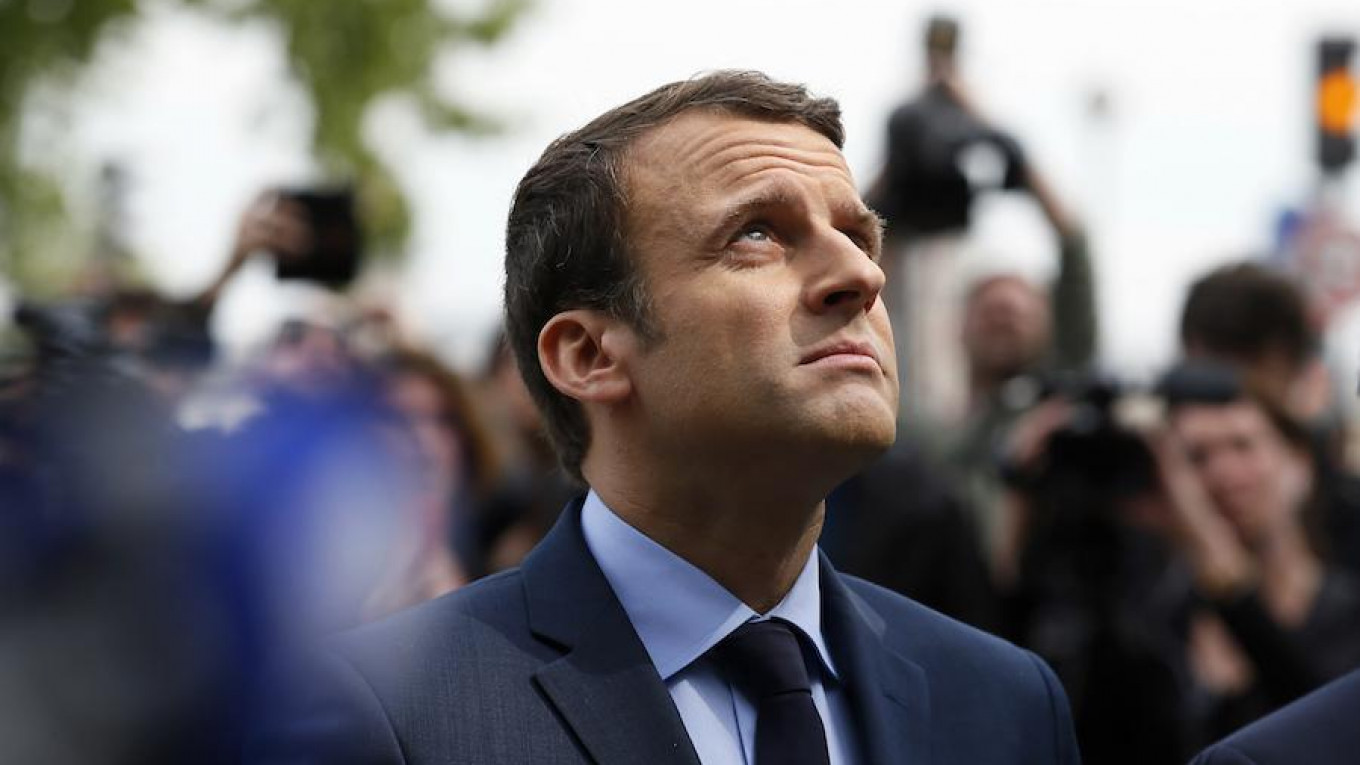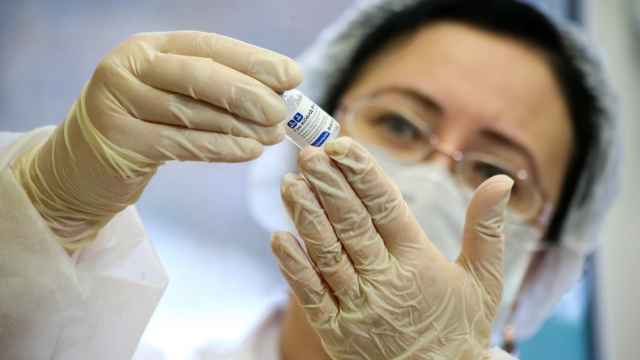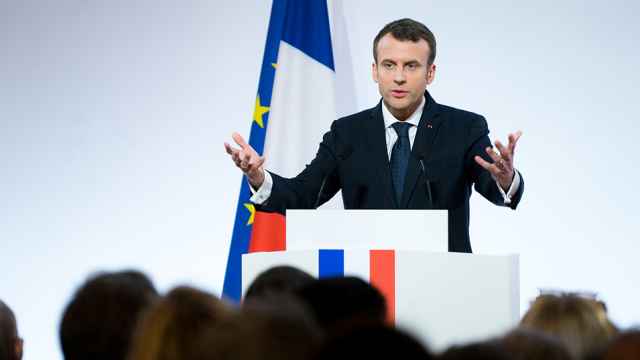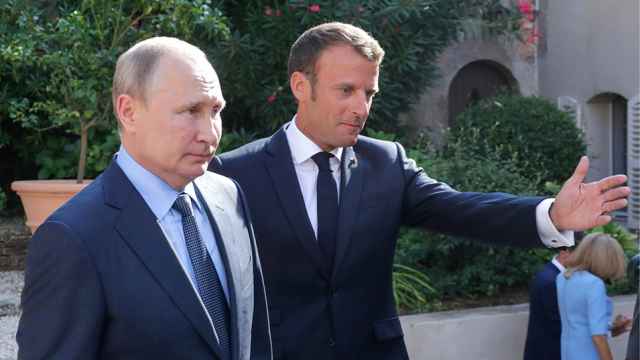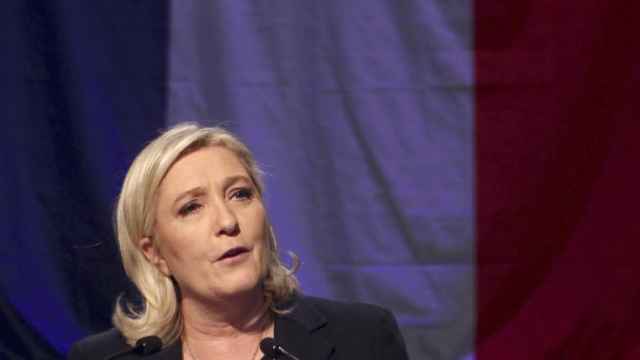With centrist Emmanuel Macron poised to win the French presidency on May 7, the Kremlin is bracing for a tense relationship with France. It sees its hopes for weakening the EU and undermining its Russia sanctions dashed.
On April 24, Kremlin Spokesman Dmitry Peskov issued a cautious statement of respect for the French people’s choice to send the 39-year-old leader of the “En Marche” movement (which did not even exist a year ago) to the second round.
But the sad reality is that, during the campaign, Moscow did not exactly hide its preferences among the candidates, and Macron was definitely not one of them.
In fact, Russian media in both France and Russia attempted to assassinate Macron’s character. Richard Ferrand, secretary-general of Macron's En Marche party, claimed in February that Russian state-controlled media Russia Today and Sputnik had spread false reports with the aim of swinging public opinion against Macron. The campaign also accused Russia of hacking its computer network.
In early April, Sputnik even published a story suggesting that Macron was “a U.S. agent” and possibly “acting in the interests of the U.S. financial market in France.”
Moscow’s effort to use a social media campaign and a deluge of fake news to slow Macron’s surge in the polls since January has created bad blood between Russia and the likely French leader. Meanwhile, the Kremlin denied it was behind the campaign to discredit Macron.
But it did not have to be this way. In November 2016, when he declared his candidacy, Macron outlined foreign policy positions that were not hostile to Moscow. He argued that Russia must play a decisive role in ending the conflict in Syria and said ousting Syrian President Bashar Assad cannot be a prior condition for taking action to end the war.
Macron criticized his former mentor, President Francois Hollande, for pushing Russia to isolate itself from Europe and to look toward Asia. He favored renewed peace talks to stabilize the situation in eastern Ukraine and the gradual lifting sanctions against Russia.
Moscow ignored Macron at the time because he was still considered a long shot. Besides, Vladimir Putin’s personal friend Francois Fillon had just won the primaries for Les Republicans, the major center-right party. Fillon instantly became the most likely winner of the election, followed by Marine Le Pen, the Kremlin’s second choice.
With at least three strong candidates — Le Pen, Fillon, and ultra-left populist Jean-Luc Melenchon — mirroring Russia’s positions on Crimea, Eastern Ukraine, NATO and Syria, it seemed the Kremlin could not lose.
Moscow was relaxed and did not wage a major media effort to influence the election. But that changed in early 2017, when Fillon found himself engulfed in a corruption scandal involving his wife and his ratings tanked. Meanwhile, Macron began surging in the polls. Le Pen’s support was also sliding, and now Macron was projected to defeat her in the runoff.
Macron ran on a pro-EU platform, arguing for European unity in the face of an increasingly assertive Russia. He also received tacit a endorsement from Germany’s Chancellor Angela Merkel and even from former U.S. President Barack Obama.
Macron’s political outlook is something of a cross between Obama and former British Prime Minister Tony Blair, the two Western leaders whose company never made Vladimir Putin comfortable. The decision to use the full power of the Russian media to influence France was as obvious as it was mistaken. Another strategic error was for Putin to directly embrace Marine Le Pen — polls showed she was slated to lose to any other candidate in the runoff. The Kremlin’s overall miscalculation was that relations with Russia would be a central issue in the French elections. They were not.
Macron toughened his stance on Russia after Moscow made it clear it wanted him to lose the election. In an interview with Jeune Afrique magazine a week before the election, he outlined a clear-eyed view of Russia’s policies and argued for a French policy of push-back.
“There is no reason to submit to any Russian domination, to be impressed or to let the Russians act in defiance of international law," he said. "If Russia meets its commitments, then we will gradually lift European sanctions and, in conjunction with Germany, we will strengthen the political and economic partnership of the EU with Russia.”
Macron blasted Russia for destabilizing democracies by financing far-right populist parties like Le Pen’s Front National and attempting to divide the Europeans. He also called for an investigation into the abuses against gays in Chechnya and blamed Syrian President Bashar Assad for the chemical attack in Idlib.
But he left the door open for Moscow to re-engage: "I will say to Vladimir Putin in a very direct and determined way that I am ready to revive a demanding dialogue to resolve the crises in which Russia is involved. I will also tell him that I will be vigilant in defending our principles, without hostility but without concession."
The Kremlin is at a crossroads. It might continue the anti-Macron campaign to try and sway the vote in favor of Le Pen — a very tall order. But it might also chose a more strategic tactic and focus on the French parliamentary election in June. Macron needs a parliamentary majority to govern effectively. But he does not really have a party to field candidates in the election. It might be possible to cobble together a diverse center-left coalition made up of his En Marche supporters and remnants of the Socialist Party, which has now been cannibalized by the far-left.
But it will be difficult. The center-right Les Republicans (led by another one of Putin’s friends, former French president Nicolas Sarkozy) and Marine Le Pen’s Front National have a good chance of winning a majority. In the French system, that would result in a “cohabitation,” with the government run by the political opposition. This would give Moscow some room for maneuver, checkmating Macron. But it is still a far-fetched scenario.
Common sense would dictate winding down the anti-Macron hysteria in the Russian media, while opening a back-door channel of communication with his advisors through Russia’s extensive and powerful business lobby in France. It will be difficult but not impossible to turn the page and move forward. But the Kremlin seems to be heading this way.



